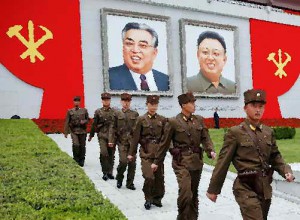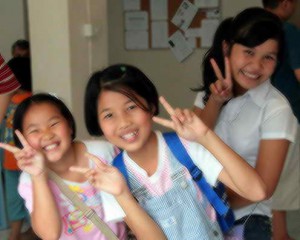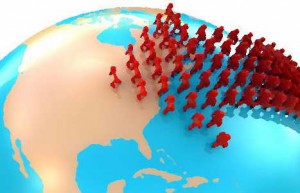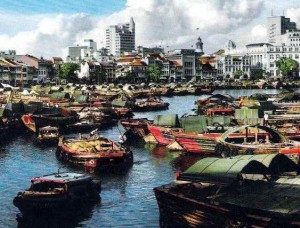 With the process of globalization, people have more opportunities and reasons to travel around the world and thus more opportunity to communicate with people from other countries. In this case, cross-cultural communication is becoming more and more important. Among the popular purposes of going abroad, study is the one gaining the most concern. Statistics indicates that, U.S is the country that accepts most of the international students, and China outputs most of the international students. Continue reading
With the process of globalization, people have more opportunities and reasons to travel around the world and thus more opportunity to communicate with people from other countries. In this case, cross-cultural communication is becoming more and more important. Among the popular purposes of going abroad, study is the one gaining the most concern. Statistics indicates that, U.S is the country that accepts most of the international students, and China outputs most of the international students. Continue reading
Category Archives: Social
Livelihood analyses of internal migration in Papua New Guinea
 This paper argues that internal migration, which is dominated by ‘rural’ migration and migrants, in Papua New Guinea (PNG), is best conceptualised within the livelihood framework of Frank Ellis (2000). The focus in this paper on rural to rural and rural to peri-urban migration is important because these types of migrants dominate in the domestic scene of migration. These types of migrants may be incorrectly labeled as ‘ labour migrants” as a result. Continue reading
This paper argues that internal migration, which is dominated by ‘rural’ migration and migrants, in Papua New Guinea (PNG), is best conceptualised within the livelihood framework of Frank Ellis (2000). The focus in this paper on rural to rural and rural to peri-urban migration is important because these types of migrants dominate in the domestic scene of migration. These types of migrants may be incorrectly labeled as ‘ labour migrants” as a result. Continue reading
Particular characteristics of educational activity organization in a higher pedagogical educational institution
 Problem definition. The process of preparation of a new generation of teachers who can effectively influence the social development requires a radical upgrading of their professional and educational preparation and studying new functions of the pedagogics of a higher school. Changes in all spheres of life and human activity, active development of cultural values in modern society objectively requires the transformation of a higher school into the Continue reading
Problem definition. The process of preparation of a new generation of teachers who can effectively influence the social development requires a radical upgrading of their professional and educational preparation and studying new functions of the pedagogics of a higher school. Changes in all spheres of life and human activity, active development of cultural values in modern society objectively requires the transformation of a higher school into the Continue reading
Religious Traditions and Political Culture in North Korea
 North Korean regime is known as one of the most anti-religious one. Even though North Korea has established some churches and reopened some Buddhist temples since the early 1980s, it is believed that North Koreans can not have or attend religious meetings without permission of the Party. Ironically, some Western and South Korean scholars assert that the political culture of North Korea includes obvious religious characteristics. Continue reading
North Korean regime is known as one of the most anti-religious one. Even though North Korea has established some churches and reopened some Buddhist temples since the early 1980s, it is believed that North Koreans can not have or attend religious meetings without permission of the Party. Ironically, some Western and South Korean scholars assert that the political culture of North Korea includes obvious religious characteristics. Continue reading
Thailand and Globalization in 2018
 The social movement in Thailand that I am investigating is distinguished by the establishment of alternative education, foundations, and networks linked to socio-political and spiritual advocacies. This social movement views state educational reform/decentralization as an incoherent, hegemonic impulse and has countered it with the development of alternative schools and advocating home-school as an alternative to public schooling. Continue reading
The social movement in Thailand that I am investigating is distinguished by the establishment of alternative education, foundations, and networks linked to socio-political and spiritual advocacies. This social movement views state educational reform/decentralization as an incoherent, hegemonic impulse and has countered it with the development of alternative schools and advocating home-school as an alternative to public schooling. Continue reading
The Evolution of AIDS/HIV Reporting in Chinese Primary Newspapers
 The reports on AIDS in the mass media play a very important role in AIDS prevention and control. Even though profound socioeconomic changes are underway in China, there are no alternatives to the primary newspapers until now. The reports on AIDS in these primary media outlets influence public opinion profoundly. Continue reading
The reports on AIDS in the mass media play a very important role in AIDS prevention and control. Even though profound socioeconomic changes are underway in China, there are no alternatives to the primary newspapers until now. The reports on AIDS in these primary media outlets influence public opinion profoundly. Continue reading
Navigating Bi-cultural
 The forces of globalization coupled with large strides in technological development have made it possible to think of the world as our backyard. With ‘time-space compression’ (Castells, 1997, p. 434), travel is a much friendlier notion, and people are challenged with the idea of global citizenship and multiple identities. Continue reading
The forces of globalization coupled with large strides in technological development have made it possible to think of the world as our backyard. With ‘time-space compression’ (Castells, 1997, p. 434), travel is a much friendlier notion, and people are challenged with the idea of global citizenship and multiple identities. Continue reading
Online Relationship Management System for Frequent Travelers
 In the age of globalization, people travel a lot for business or entertainment purposes. Thanks to the techniques of information retrieval, searching localized information is much easier than ever for frequent travelers. Cultural shock can be minimized through preparation and education. As a result, doing Internet research is an efficient way to achieve localization. Continue reading
In the age of globalization, people travel a lot for business or entertainment purposes. Thanks to the techniques of information retrieval, searching localized information is much easier than ever for frequent travelers. Cultural shock can be minimized through preparation and education. As a result, doing Internet research is an efficient way to achieve localization. Continue reading
Postcolonial Anxieties in Singapore
 Literary theorists discuss the pervasive dichotomy of the Self/Other, apparent across various epistemological categories such as gender, race, class and religion. Among other things, they discuss this as a projection of the Self’s fears and desires onto the Other as a means of concretising and thereby mitigating these anxieties. The Self thus constructs its identity based on perceived differences with its Other. Continue reading
Literary theorists discuss the pervasive dichotomy of the Self/Other, apparent across various epistemological categories such as gender, race, class and religion. Among other things, they discuss this as a projection of the Self’s fears and desires onto the Other as a means of concretising and thereby mitigating these anxieties. The Self thus constructs its identity based on perceived differences with its Other. Continue reading
Electronic government and information society
 Now all countries of the world to some extent carry out information process. The first country which has begun information is the USA. Other industrially developed countries of the world, having understood perceptivity and inevitability of this direction, have quickly enough oriented and introduction of computers and means of telecommunications Continue reading
Now all countries of the world to some extent carry out information process. The first country which has begun information is the USA. Other industrially developed countries of the world, having understood perceptivity and inevitability of this direction, have quickly enough oriented and introduction of computers and means of telecommunications Continue reading
